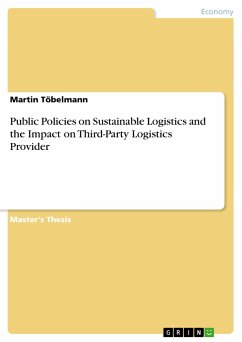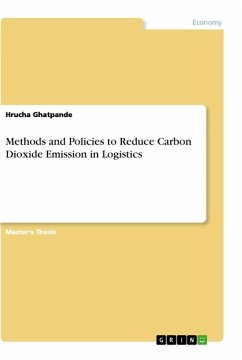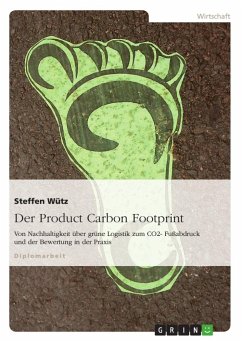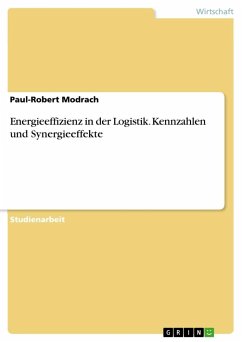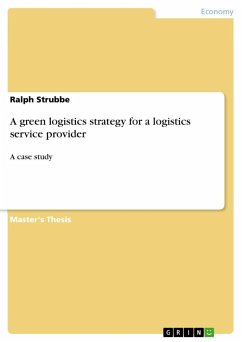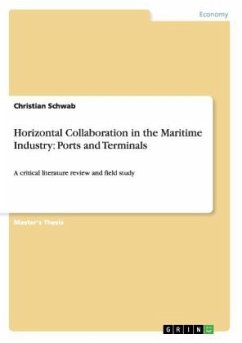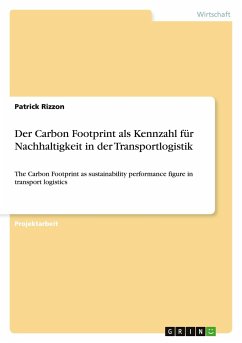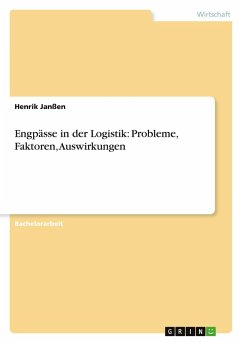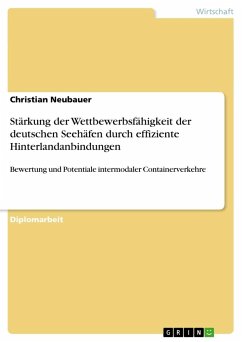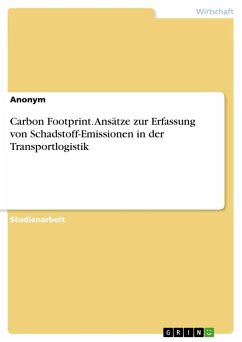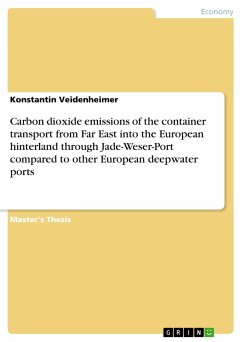
Carbon dioxide emissions of the container transport from Far East into the European hinterland through Jade-Weser-Port compared to other European deepwater ports

PAYBACK Punkte
0 °P sammeln!
Master's Thesis from the year 2011 in the subject Business economics - Supply, Production, Logistics, grade: A, Heriot-Watt University Edinburgh, course: BWL - Logistik, Verkehr, Transport und Supply Chain Management, language: English, abstract: This dissertation investigates carbon dioxide emissions of maritime container transport from Asia into the European hinterland through the emerging German Jade-Weser-Port (JWP) compared to the deepwater ports of Rotterdam, Antwerp, Zeebrugge and Trieste. Furthermore the deepwater ports are compared on the basis of competitive factors such as hinterlan...
Master's Thesis from the year 2011 in the subject Business economics - Supply, Production, Logistics, grade: A, Heriot-Watt University Edinburgh, course: BWL - Logistik, Verkehr, Transport und Supply Chain Management, language: English, abstract: This dissertation investigates carbon dioxide emissions of maritime container transport from Asia into the European hinterland through the emerging German Jade-Weser-Port (JWP) compared to the deepwater ports of Rotterdam, Antwerp, Zeebrugge and Trieste. Furthermore the deepwater ports are compared on the basis of competitive factors such as hinterland connectivity. The thesis also addresses CO2 reduction measures for the maritime door-to-door container transport. Maritime container transport accounts for approximately 90 percent of global trade volumes. Largest container vessels represent challenges for container ports, such as the required draft of 15.5 meters. In order to be competitive, many ports try to integrate in global supply chains. Furthermore, environmental issues play a growing role in the maritime business. Thus, the dissertation concentrates on CO2 emissions from maritime supply chains. Carbon emissions are calculated by applying activity-based approach for road emissions and energy-based method for ship emissions. The online carbon auditing tool "Ecotransit" is used for carbon auditing of rail and inland waterway emissions. For ports an average value of 17.5 kg CO2/TEU is assumed. The main findings are that north-eastern part of Germany and northern region of Eastern Europe can be reached under minimum CO2 emissions from Jade-Weser-Port. However, JWP provides the worst hinterland connection compared to other deepwater ports. Antwerp and Trieste are inappropriate to serve ultra large container vessels because of insufficient access channel and unsuitable quay cranes, respectively. Ship emissions can be cut by more than 53% by reducing the speed from 19 to 24 knots. In order to reduce ocean emissions it is recommended to reduce cruising speed and to operate larger ships. Port emissions can be reduced by providing on-shore electricity for ships. Furthermore it is essential to modernise JWP's rail connection since the rail-track is not electrified over a distance of around 53 kilometres and has two single track sections of 5 and 7 kilometres. The main conclusion is that JWP should implement carbon auditing from the start of its operations.[...]




